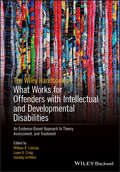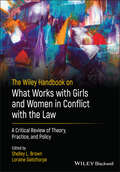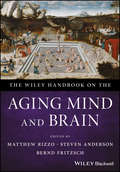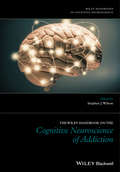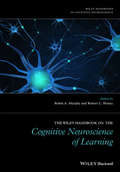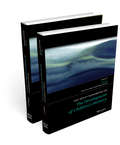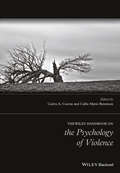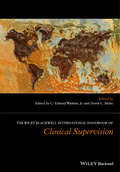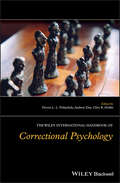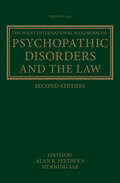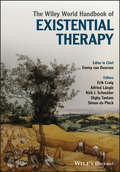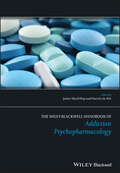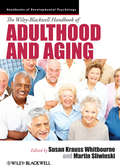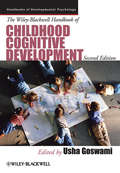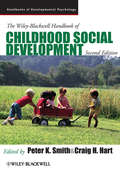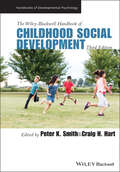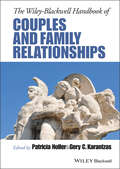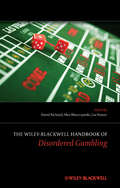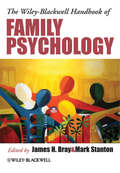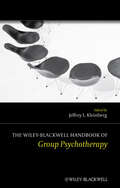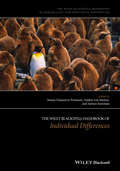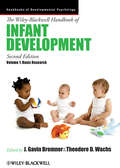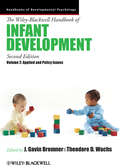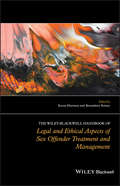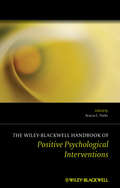- Table View
- List View
The Wiley Handbook on What Works for Offenders with Intellectual and Developmental Disabilities: An Evidence-Based Approach to Theory, Assessment, and Treatment
by William R. Lindsay Leam A. Craig Dorothy GriffithsBrings together the growing amount of evidence on the assessment and treatment of offenders with intellectual and developmental disabilities. Written by a team of international experts, this comprehensive and informative book provides a contemporary picture of evidence-based practice for offenders with intellectual and developmental disabilities. By adopting a scientist-practitioner position directed at an academic level with practitioner guidelines, it provides a valuable reference source for professionals from allied disciplines who are using or seeking to apply research for this client group. The Wiley Handbook of What Works for Offenders with Intellectual and Developmental Disabilities: An Evidence Based Approach to Theory, Assessment and Treatment is divided into five sections: Introduction, Phenotypes & Genotypes and Offending Behavior, Validated Assessments, Treatment, and Conclusions. The Introduction offers an overview of the entire book and is followed by a second overview covering the ethics of evidence-based practice. After that come chapters on protecting the rights of people with intellectual disabilities in correctional settings, and behavioral and cognitive phenotypes in genetic disorders associated with offending. The third part of the book studies the assessment of individuals with anger and violence issues, inappropriate sexual behavior, alcohol abuse, and emotional difficulties. Next comes a section that looks how to offenders can be treated. The final section discusses future directions and requirements for offenders with intellectual and developmental disabilities. Provides an overview of the ethical challenges and issues faced by those who work with intellectually and developmentally disabled offenders Focuses on proof of treatment effectiveness and validation of assessment methods to direct readers toward "What Works" Features contributions from authors across the entire English-speaking world including the UK, US, Canada, Australia, and New Zealand The Wiley Handbook of What Works for Offenders with Intellectual and Developmental Disabilities: An Evidence Based Approach to Theory, Assessment and Treatment will appeal to all who work in the field of offenders with intellectual and developmental disabilities, including nursing staff, social workers and probation officers, medical and psychology staff, and more.
The Wiley Handbook on What Works with Girls and Women in Conflict with the Law: A Critical Review of Theory, Practice, and Policy (Wiley Series in Offender Rehabilitation)
by Leam A. Craig Louise DixonThe Wiley Handbook on What Works with Girls and Women in Conflict with the Law The most practical discussion of the rehabilitation of girls and women in conflict with the law in the correctional arena What Works with Girls and Women in Conflict with the Law is the leading examination of evidence-based practice in the field of gender-responsive corrections. Adopting an international and intersectional approach, the distinguished authors seek to collect the best available data and thinking on what works with girls and women and apply it to the real-world problems facing correctional systems today. As part of its contextual and rich approach to the subject, What Works with girls and women in conflict with the law, covers a broad variety of topics, ranging from theories of female involvement in crime, security classification and risk assessment, evidence-based treatment and supervision approaches, special populations (such as Indigenous women), to legal/policy developments in the field of gender-responsive corrections. Perfect for students and practitioners in the field of psychology, criminology, social work, criminal justice, and corrections, this is the only reference of its kind to focus on the practical applications of the latest theory.
The Wiley Handbook on the Aging Mind and Brain
by Steven Anderson Bernd Fritzsch Matthew RizzoA thought-provoking treatise on understanding and treating the aging mind and brain This handbook recognizes the critical issues surrounding mind and brain health by tackling overarching and pragmatic needs so as to better understand these multifaceted issues. This includes summarizing and synthesizing critical evidence, approaches, and strategies from multidisciplinary research—all of which have advanced our understanding of the neural substrates of attention, perception, memory, language, decision-making, motor behavior, social cognition, emotion, and other mental functions. Written by a plethora of health experts from around the world, The Wiley Handbook on the Aging Mind and Brain offers in-depth contributions in 7 sections: Introduction; Methods of Assessment; Brain Functions and Behavior across the Lifespan; Cognition, Behavior and Disease; Optimizing Brain Function in Health and Disease; Forensics, Competence, Legal, Ethics and Policy Issues; and Conclusion and New Directions. Geared toward improving the recognition, diagnosis, and treatment of many brain-based disorders that occur in older adults and that cause disability and death Seeks to advance the care of patients who have perceptual, cognitive, language, memory, emotional, and many other behavioral symptoms associated with these disorders Addresses principles and practice relevant to challenges posed by the US National Academy of Sciences and National Institute of Aging (NIA) Presents materials at a scientific level that is appropriate for a wide variety of providers The Wiley Handbook on the Aging Mind and Brain is an important text for neurologists, psychiatrists, psychologists, physiatrists, geriatricians, nurses, pharmacists, social workers, and other primary caregivers who care for patients in routine and specialty practices as well as students, interns, residents, and fellows.
The Wiley Handbook on the Cognitive Neuroscience of Addiction
by Stephen J. WilsonThis volume provides a thorough and up-to-date synthesis of the expansive and highly influential literature from the last 30 years by bringing together contributions from leading authorities in the field, with emphasis placed on the most commonly investigated drugs of abuse. Emphasises the most commonly investigated drugs of abuse, including alcohol, cocaine, nicotine, and opiates Brings together the work of the leading authorities in all major areas of the field Provides novel coverage of cutting-edge methods for using cognitive neuroscience to advance the treatment of addiction, including real-time neurofeedback and brain stimulation methods Includes new material on emerging themes and future directions in the use of cognitive neuroscience to advance addiction science
The Wiley Handbook on the Cognitive Neuroscience of Learning
by Robin A. Murphy Robert C. HoneyThe Wiley Handbook on the Cognitive Neuroscience of Learning charts the evolution of associative analysis and the neuroscientific study of behavior as parallel approaches to understanding how the brain learns that both challenge and inform each other. Covers a broad range of topics while maintaining an overarching integrative approach Includes contributions from leading authorities in the fields of cognitive neuroscience, associative learning, and behavioral psychology Extends beyond the psychological study of learning to incorporate coverage of the latest developments in neuroscientific research
The Wiley Handbook on the Development of Children's Memory
by Robyn Fivush Patricia BauerThe all-embracing, two-volume Handbook on the Development of Children's Memory represents the first place in which critical topics in memory development are covered from multiple perspectives, from infancy through adolescence. Forty-four chapters are written by experienced researchers who have influenced the field. Edited by two of the world's leading experts on the development of memory.Discusses the importance of a developmental perspective on the study of memoryThe first ever handbook to bring together the world's leading academics in one reference guide Each section has an introduction written by one of the Editors, who have also written an overall introduction that places the work in historical and contemporary contexts in cognitive and developmental psychology
The Wiley Handbook on the Psychology of Violence
by Callie Marie Rennison Carlos A. CuevasThe Wiley Handbook on the Psychology of Violence features a collection of original readings, from an international cast of experts, that explore all major issues relating to the psychology of violence and aggressive behaviors. Features original contributions from an interdisciplinary cast of scholars - leading experts in their fields of study Includes the latest violence research – and its implications for practice and policy Offers coverage of current issues relating to violence such as online violence and cybercriminal behavior Covers additional topics such as juvenile violence, sexual violence, family violence, and various violence issues relating to underserved and/or understudied populations
The Wiley International Handbook of Clinical Supervision
by C. Edward Watkins Jr. Derek L. MilneThis is the first handbook to examine the theory, research, and practice of clinical supervision from an international, multi-disciplinary perspective.Focuses on conceptual and research foundations, practice foundations, core skills, measuring competence, and supervision perspectivesIncludes original articles by contributors from around the world, including Australia, Finland, Hong Kong, Slovenia, South Africa, Sweden, the United Kingdom, and the United StatesAddresses key aspects of supervision, including competency frameworks, evidence-based practice, supervisory alliances, qualitative and quantitative assessment, diversity-sensitive supervision, and moreFeatures timely and authoritative coverage of the latest research in the field and novel ideas for clinical practice
The Wiley International Handbook of Correctional Psychology
by Andrew Day Clive R. Hollin Devon L. L. PolaschekA two-volume handbook that explores the theories and practice of correctional psychology With contributions from an international panel of experts in the field, The Wiley International Handbook of Correctional Psychology offers a comprehensive and up-to-date review of the most relevant topics concerning the practice of psychology in correctional systems. The contributors explore the theoretical, professional and practical issues that are pertinent to correctional psychologists and other professionals in relevant fields. The Handbook explores the foundations of correctional psychology and contains information on the history of the profession, the roles of psychology in a correctional setting and examines the implementation and evaluation of various interventions. It also covers a range of topics including psychological assessment in prisons, specific treatments and modalities as well as community interventions. This important handbook: Offers the most comprehensive coverage on the topic of correctional psychology Contains contributions from leading experts from New Zealand, Australia, Europe, and North America Includes information on interventions and assessments in both community and imprisonment settings Presents chapters that explore contemporary issues and recent developments in the field Written for correctional psychologists, academics and students in correctional psychology and members of allied professional disciplines, The Wiley International Handbook of Correctional Psychology provides in-depth coverage of the most important elements of the field.
The Wiley International Handbook on Psychopathic Disorders and the Law
by Alan R. Felthous Henning SaßThe economic impact of society's attempts to rehabilitate and contain psychopathically disordered individuals can be enormous. Understanding the nature of these disorders, developing accurate and valid assessment methods, and providing effective treatment and safe management cannot be underestimated. Including contributions from an international panel of experts from Europe, North America, and Asia, this two-volume set offers an in-depth, multidisciplinary look at key aspects of the development and etiology of psychopathic disorders; current methods of intervention, treatment, and management; and how these disorders impact decision-making in civil and criminal law. The most comprehensive major reference work available on psychopathy and the law, The Wiley International Handbook on Psychopathic Disorders and the Law, 2nd Edition: Covers the full history and conceptual development of psychopathic disorders Provides unique and enlightening perspectives on the subject from some of the world’s most well-renowned professionals in the field Looks at the etiology and pathogenesis of psychopathic disorders Examines current methods for the intervention, treatment, and management of ADHD, antisocial behavior, and impulsive aggression Provides in-depth discussions of civil and criminal law issues The Wiley International Handbook on Psychopathic Disorders and the Law, 2nd Edition is a must-have reference for practitioners and academics in clinical psychology, forensic psychology, psychiatry, probation, law, law enforcement, and social work.
The Wiley World Handbook of Existential Therapy
by Emmy Van Deurzen Digby Tantam Kirk J. Schneider Erik Craig Alfried Laengle Simon Du PlockTHE DEFINITIVE, UP-TO-DATE OVERVIEW OF EXISTENTIAL THERAPY Comprising a diverse range of theories and practices, existential therapy is a philosophically-informed approach to counselling and psychotherapy—stressing the philosophical exploration of an individual's experiences while emphasizing the individual's freedom and responsibility to facilitate a higher degree of meaning and well-being. In recent years existential therapy has become increasingly recognized as a valuable and distinctive, albeit diverse, approach to psychotherapy upholding the dignity, wholeness, freedom, creativity, and worth of every human being. The Wiley World Handbook of Existential Therapy provides an inclusive overview of the history, development, theory, philosophy, applications, and practices of the field. Inspired by the first World Congress for Existential Therapy in London in 2015, this timely volume brings together the entire field of existential therapy in its current form and examines its development over the past century. The editors, all experts in their respective areas, have assembled a team of authors and practitioners to present in-depth, systematic coverage of the principal forms of existential theory and therapeutic practice, present-day issues and challenges, contemporary developments and research, and newly evolving forms of existential therapy around the world. Invaluable to all practicing and training psychotherapists, this book: Provides a unique overview of the field, covering the practical, international, and historical aspects of existential therapy Covers Daseinsanalysis, existential-phenomenological therapy, existential-humanistic and existential-integrative therapy, existential group therapy, and existential analysis and logotherapy Enables readers to make systematic comparisons of different forms of existential therapy Includes clinical case studies, illustrative examples, complete references and footnotes, suggestions for further reading and online resources, and more The Wiley World Handbook of Existential Therapy, the most complete and up-to-date volume on the subject, is an indispensable resource for all psychotherapists and counsellors, in training or in practice, researchers and academics, and other practitioners who utilize interpersonal methods.
The Wiley-Blackwell Handbook of Addiction Psychopharmacology
by James Mackillop Harriet De WitThe Wiley-Blackwell Handbook of Addiction Psychopharmacology is an authoritative collection of the most current research approaches to the study of drug addiction. Provides students and scholars with the practical tools to do the best work possible in addiction psychopharmacology Features reviews on the empirical relevance of the research methods and the nuances of the methodologies used Topics covered include core methods for assessing drug effects, distal and proximal determinants of drug use, and insights from cognitive neuroscience Includes contributions from a diverse range of experts that reflect the multidisciplinary nature of the field
The Wiley-Blackwell Handbook of Adulthood and Aging (Wiley Blackwell Handbooks of Developmental Psychology #40)
by Susan Krauss Whitbourne Martin J. SliwinskiThis exceptional collection draws on the most recent demographic data and combines classic research with cutting-edge approaches to provide an invaluable overview of the developmental psychology of the adult years. Covers a wide range of topics within adult development and aging, from theoretical perspectives to specific content areas Includes newly commissioned essays from the top researchers in the field Takes a biopsychosocial perspective, covering the biological, psychological and social changes that occur in adulthood
The Wiley-Blackwell Handbook of Childhood Cognitive Development
by Usha GoswamiThis definitive volume is the result of collaboration by top scholars in the field of children's cognition.New edition offers an up-to-date overview of all the major areas of importance in the field, and includes new data from cognitive neuroscience and new chapters on social cognitive development and language Provides state-of-the-art summaries of current research by international specialists in different areas of cognitive developmentSpans aspects of cognitive development from infancy to the onset of adolescenceIncludes chapters on symbolic reasoning, pretend play, spatial development, abnormal cognitive development and current theoretical perspectives
The Wiley-Blackwell Handbook of Childhood Social Development (Wiley Blackwell Handbooks Of Developmental Psychology Ser. #35)
by Peter K. Smith Craig H. HartThe Wiley-Blackwell Handbook of Childhood Social Development, Second Edition presents an authoritative and up-to-date overview of research and theory concerning a child's social development from pre-school age to the onset of adolescence. Presents the most up-to-date research and theories on childhood social development Features chapters by an international cast of leaders in their fields Includes comprehensive coverage of a range of disciplinary perspectives Offers all new chapters on children and the environment, cultural influences, history of childhood, interventions, and neuro-psychological perspectives Represents an essential resource for students and researchers of childhood social development
The Wiley-Blackwell Handbook of Childhood Social Development (Wiley Blackwell Handbooks of Developmental Psychology)
by Peter K. Smith Craig H. HartThe most up-to-date edition of a leading resource on the research and theory of the social development of children In the newly revised Third Edition of The Wiley-Blackwell Handbook of Childhood Social Development, a team of eminent researchers delivers a current and comprehensive discussion of the research and theory of childhood social development. With chapters written by an international collection of leaders in their respective fields, this edited volume offers robust coverage of a range of disciplinary perspectives, including psychological, sociological, anthropolgical, evolutionary, religious, cultural, ecological, athletic, and more The latest edition offers brand-new chapters on helping children with autism, the impact of social networking platforms on childhood social development, the influence of mass media, war and famine, the climate crisis, and the influence of the COVID-19 Pandemic. Containing authoritative explorations of child social development from pre-school to the onset of adolescence, The Wiley-Blackwell Handbook of Childhood Social Development also provides: A thorough introduction to historical perspectives on the social development of children, including the conceptual and empirical precursors of contemporary social development research Comprehensive explorations of various disciplinary perspectives, including behavioral genetics, the brain and social development in childhood, and evolutionary perspectives on social development Practical discussions of the ecological contexts of childhood social development, including the relationship between the physical environment and social development In-depth examinations of culture and immigration, including the social development of immigrant children with a focus on Europe, and on Asian and Latinx children in the US. Perfect for advanced undergraduate and graduate students of courses in child psychology, human development, or educational psychology, The Wiley-Blackwell Handbook of Childhood Social Development will also earn a place in the libraries of researchers seeking a one-stop, comprehensive resource for the social development of children.
The Wiley-Blackwell Handbook of Couples and Family Relationships
by Gery C. Karantzas Patricia NollerThe Wiley-Blackwell Handbook of Couples and Family Relationships presents original articles from leading experts that link research, policy, and practice together to reflect the most current knowledge of contemporary relationships. Offers interesting new perspectives on a range of relationship issues facing twenty-first century Western society Helps those who work with couples and families facing with relationship issues Includes practical suggestions for dealing with relationship problems Explores diverse issues, including family structure versus functioning; attachment theory; divorce and family breakdown; communication and conflict; self regulation, partner regulation, and behavior change; care-giving and parenting; relationship education; and therapy and policy implications
The Wiley-Blackwell Handbook of Disordered Gambling
by Lia Nower David C. Richard Alex BlaszczynskiThe Wiley-Blackwell Handbook of Disordered Gambling is a complete guide to the current empirical literature relating to the conceptualization, assessment, and treatment of disordered gambling. The international contributors are all experienced, practicing clinicians who discuss gambling within a global context. Best-practice guidelines for the clinical management of problem and disordered gamblingContains empirically derived findings that translate research into practical clinical applications that clinicians and counselors can use in understanding and treating problem gamblersBrings together a distinguished international group of scholars whose contributions discuss gambling as it occurs around the globeClearly organized into sections that cover conceptualization, research, assessment, treatment, and special topics
The Wiley-Blackwell Handbook of Family Psychology
by James H. Bray Mark StantonThe Handbook of Family Psychology provides a comprehensive overview of the theoretical underpinnings and established practices relating to family psychology. Provides a thorough orientation to the field of family psychology for clinicians Includes summaries of the most recent research literature and clinical interventions for specific areas of interest to family psychology clinicians Features essays by recognized experts in a variety of specialized fields Suitable as a required text for courses in family psychology, family therapy, theories of psychotherapy, couples therapy, systems theory, and systems therapy
The Wiley-Blackwell Handbook of Group Psychotherapy
by Jeffrey L. KleinbergA user-friendly guide of best practice for leading groups in various settings and with different populations, which incorporates the latest developments in today's mental health marketplace.Features multiple theoretical perspectives and guidelines for running groups for diverse populations, in the US and worldwideOffers modern approaches and practical suggestions in a user-friendly and jargon-free style, with many clinical examplesIncludes a major component on resiliency and trauma relief work, and explores its impact on cliniciansAccompanied by an online resource featuring discussions of psychotherapeutic techniques in practice
The Wiley-Blackwell Handbook of Individual Differences
by Tomas Chamorro-Premuzic Adrian Furnham Sophie Von StummThe Wiley-Blackwell Handbook of Individual Differences provides a comprehensive, up-to-date overview of recent research, current perspectives, practical applications, and likely future developments in individual differences. Brings together the work of the top global researchers within the area of individual differences, including Philip L. Ackerman, Ian J. Deary, Ed Diener, Robert Hogan, Deniz S. Ones and Dean Keith SimontonCovers methodological, theoretical and paradigm changes in the area of individual differencesIndividual chapters cover core areas of individual differences including personality and intelligence, biological causes of individual differences, and creativity and emotional intelligence
The Wiley-Blackwell Handbook of Infant Development, Volume 1: Basic Research (Wiley Blackwell Handbooks of Developmental Psychology #31)
by J. Gavin Bremner Theodore D. WachsNow part of a two-volume set, the fully revised and updated second edition of The Wiley-Blackwell Handbook of Infant Development, Volume 1: Basic Research provides comprehensive coverage of the basic research relating to infant development. Updated, fully-revised and expanded, this two-volume set presents in-depth and cutting edge coverage of both basic and applied developmental issues during infancy Features contributions by leading international researchers and practitioners in the field that reflect the most current theories and research findings Includes editor commentary and analysis to synthesize the material and provide further insight The most comprehensive work available in this dynamic and rapidly growing field
The Wiley-Blackwell Handbook of Infant Development, Volume 2: Applied and Policy Issues (Wiley Blackwell Handbooks of Developmental Psychology #36)
by J. Gavin Bremner Theodore D. WachsNow part of a two-volume set, the fully revised and updated second edition of The Wiley-Blackwell Handbook of Infant Development, Volume 2: Applied and Policy Issues provides comprehensive coverage of the applied and policy issues relating to infant development. Updated, fully-revised and expanded, this two-volume set presents in-depth and cutting edge coverage of both basic and applied developmental issues during infancy Features contributions by leading international researchers and practitioners in the field that reflect the most current theories and research findings Includes editor commentary and analysis to synthesize the material and provide further insight The most comprehensive work available in this dynamic and rapidly growing field
The Wiley-Blackwell Handbook of Legal and Ethical Aspects of Sex Offender Treatment and Management
by Bernadette Rainey Karen HarrisonThis handbook combines the latest theory on a high-profile, complex subject in criminology, exploring the legal and ethical dimensions of society's response to sex offenders in jurisdictions from the USA to Japan.The first publication to offer a detailed and wide-ranging analysis of legal and ethical issues relating to sex offender treatment and managementCovers a range of related issues, from media coverage to equality dutiesPresents research from numerous national jurisdictions including the UK, USA, Australia, New Zealand, Canada, Norway, Germany, Netherlands, Japan, and IsraelIncludes perspectives from respected leading academics and practitioners, including William Marshall, Tony Ward, Doug Boer, Daniel Wilcox, and Marnie Rice
The Wiley-Blackwell Handbook of Positive Psychological Interventions
by Acacia C. Parks Stephen SchuellerCollating for the first time a range of techniques in positive psychology, this handbook introduces topics such as courage, empathy and humor, and spans areas as diverse as gratitude, forgiveness and strengths. It also explores special considerations such as ethics and motivation, and offers informed conjecture on future directions in research and practice. Comprehensive content summarizes theory and research on many areas of positive psychology intervention for the first time and provides essential updates on established interventionsFeatures contributions from an array of leading researchers, including Bob Emmons, Sonja Lyubomirsky and Shane LopezCovers established interventions - for instance, coaching and family therapy - as well as newly developed interventions - such as schizophrenia or stopping smoking
